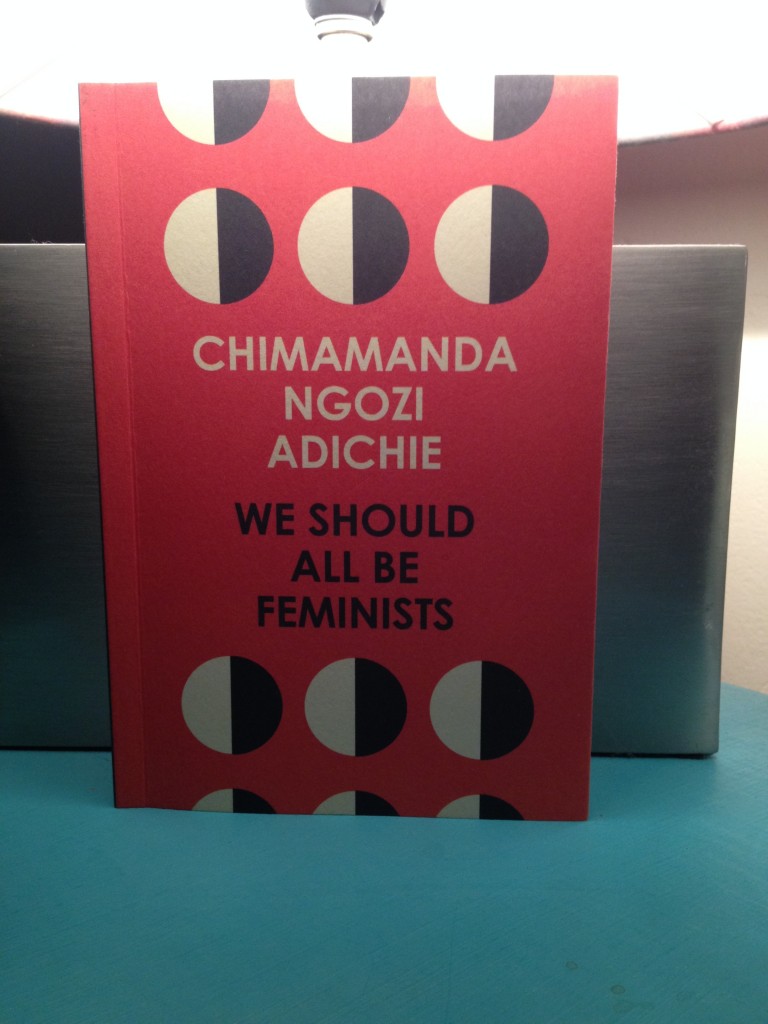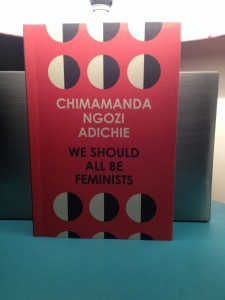
If you have not read this essay by Chimamanda Ngozi Adichie I strongly urge you to do so, it is an adaptation of her TedxEuston talk and it is only 48 short pages long. Men don’t be put off, the word feminism applies to you too, but I’m sure you know that by now.

I know I am late to the game on this one, feminism is something that I haven’t written about much, however it is something that I care about both for personal reasons but also because I hold a strong belief that our societies would be better for all if everyone lived by feminist values. As you read Chimamanda’s essay or watch the TedxEuston talk you may recognise some of the words, this is because Beyonce has sampled them in her “Pretty Hurts” video.
I don’t think that I should have to explain this because it is said so much but:
Feminism = equal rights for both sexes
I have often thought that the name should be changed, that the words itself harbours the misconceived stereotypes of what a feminist is, however, since reading this essay I have changed my mind, until we live in a world where men don’t have more privilege I think that it is important to remind people that gender equality involves making changes for women.
Chimamanda Adichie’s view of feminism comes from the stance of a Nigerian woman, her culture and upbringing were somewhat different from mine, and probably different from yours, and whilst the examples or the extremity of the situation may be different in Chimamanda’s essay, I have been a victim of gender equality as I think many women are. My personal view is that feminism should be looked at from two different, but linked, stand points:
- We need to support feminism in cultures where there are obvious and marked differences in the rights and treatment of women
- We need to support feminism in cultures where inequality is more subtle and where feminine traits are belittled behind a veil of equal rights
I am very lucky, I have grown up in a world where, as a woman, I have seemingly equal rights to men in terms of getting a good education, and, in theory, having equality in the home and in the work place. I have not had to live in a society where gang rape of a woman or girl is seen to be her fault, where women have different legal rights from men, where they live in fear of female genital mutilation or where domestic abuse of women is common place and accepted.
As a teenager I had absolutely no clue that I was growing up in a world where I would struggle more because I was a woman. When I was young I was determined to prove that being a woman wouldn’t mean that I couldn’t do certain things, so much so that I shut down my femininity and made decisions not based on what was right for me but what would prove that I could be independent and just as good as a man. I got it a bit wrong, mistaking being just as good as a man with being just like a man should be. No emotions, dowdy clothes, intelligent, hard, a provider, strong, good at science?!? It’s mind-boggling looking back.

However, since being an adult I have found it hard to be a woman in the workplace (I don’t really experience issues elsewhere, and I am talking about a number of different past employers/clients/colleagues) because I have come to the realisation that my femininity is important to me, and let it show. Because of this I have put up with things that are degrading, but worse than that is the constant feeling of “you don’t belong here” directed at my feminine traits. Showing intelligence has to be metered, speaking up is frowned upon, enjoying wearing stylish or pretty clothes and liking pop music is used as a way to belittle me or make me seem flippant, I should make my voice deeper, I should try to look older; being forced into battles over getting money I am owed for a job that I have done. These things take their toll because I refuse to switch off my sensitivity, I am strong and if I chose to fight you will not win, however I am also compassionate towards others and I all to often let that stop me from getting what I deserve. Balancing this is exhausting and therefore I have to stop being afraid of my power, especially if it is directed at those who think it is ok to step on me.

I think that there are two parts of the essay that really speak to me and help me to understand the role that feminism has to play:
1. The part that starts “We do our men a disservice”, and it is all about how we define masculinity. Our view of what is masculine is very narrow, we are almost all brought up to believe that masculinity and money are intrinsically linked, and boys are brought up to believe that they should be pure masculine, that they have to be hard. As Chimamanda puts it, the harder a man feels they have to be the more fragile their ego, the more fragile the ego the more women have to pander to them to nurture the weak ego. Does this ring a few bells? It does for me, particularly in the workplace where I not only have to put in the hard graft but also deal with all sorts of very fragile egos. If only men didn’t feel like they had to be so hard, I hope that the next generation of women don’t have to put up with as many sleepless nights and anxious days as a result of the fragile male ego. Men, I don’t paint you all with the same brush, I understand that you are in a difficult position, just like women you have a choice, be hard or be vulnerable. I chose to be vulnerable because if I don’t I am not free to be myself. It hurts though, a lot.
“We teach women to shrink themselves, to make themselves smaller”
I have also done this my whole life, not consciously, but questioning whether I should say something loud enough to be heard, especially if it might rock the status quo. I am very passionate about things, if I talk I talk loud, I have been afraid of that voice for years, it has started to come out more, but why should it take years of striving just to show myself? When I talk about this with other people nearly every female resonates with this feeling. What does that say about our inherent self-esteem? We have this societally built feeling that we are not quite good enough to be heard.
2. This bit needs no explanation
“I have chosen to no longer be apologetic for my femininity and I want to be respected for all my femaleness.”
“I am girly, I am happily girly”
I hope that you have enjoyed thinking a bit more about this, I feel like it is something so close to my heart and I often think that the only people who think about it are those who are advocating change.
Becky
P.S. Now listen to Chimamanda because she says it so much more beautifully than me:
